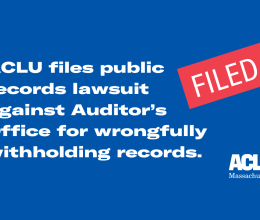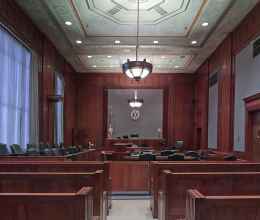
Six legislators tasked with reconciling different versions of public records reform legislation passed by the state House and Senate today released the final version of a compromise bill. The Massachusetts Freedom of Information Alliance--a coalition of open-government groups--lauded the results of their work as both strong and balanced, and called for swift passage by the full legislature. The new bill represents months of work by the conference committee, which conducted an unusually public and transparent deliberative process.
If signed into law by Governor Baker, the legislation would accomplish several important things to address widely criticized weaknesses in Massachusetts public records law, which make it harder for citizens to get information about how their government functions:
- Set clear limits on how much money government agencies can charge for public records;
- Set reasonable time frames for responses to public records requests;
- Incorporate flexibility, by allowing municipalities to request additional time for compliance and the ability to charge higher fees to cover reasonable costs;
- Strengthen enforcement of the law by giving courts the ability to award attorney fees to those wrongly denied access to public records, which would bring Massachusetts in line with 47 other states. The new law would not make such fee awards mandatory, but would establish a rebuttable presumption in favor of covering requesters’ legal costs when courts find the law has been violated.
"This is win-win legislation, based on practical, tested solutions," said Carol Rose, executive director of the ACLU of Massachusetts. "These reforms will go a long way to fix our broken public records law and begin to restore accountability that we sorely need. The conference committee deserves a ton of credit for both its process and the strong final product. The final bill represents real, meaningful progress for transparency."
In response to widespread criticism that the Massachusetts public records law ranks among the weakest in the country and that public officials routinely flout it, the House passed a reform bill last fall and the Senate followed suit in February. Since then, the conference committee has, in an unusual and open process, held a series of additional hearings to solicit input from a broad group of stakeholders.
"This conference committee bill will significantly increase freedom of information in Massachusetts government," said Pam Wilmot, executive director of Common Cause Massachusetts. "It incorporates many of the reforms we have been fighting for, such as reining in outrageous charges for public records and putting needed teeth into enforcement of the law. When it is passed, Massachusetts will no longer have one of the worst public records laws in the country. We hope it gets to the governor’s desk very soon and he signs it without delay."
In November, the Center for Public Integrity released a report that gave the Commonwealth an F grade on public access to government information for the second time in a row. Dozens of organizations have advocated for comprehensive public records law reform, contending that the law is weak and needs updating for the digital age. State lawmakers made their last substantive amendment to the law in 1973.
"With this bill, legislative leadership from both the House and Senate have shown they take seriously the importance of reforming our public records law," said Bob Ambrogi, executive director of the Massachusetts Newspaper Publishers Association. "This bill would enhance the ability of citizens and journalists to obtain records on a timely basis at a reasonable cost and to enforce their rights when they are wrongfully denied access to public records."
The compromise bill includes provisions designed to reduce the cost of obtaining public records and ensure timely responses to information requests. It also includes safety-valve mechanisms to enable municipalities to get extensions on compliance deadlines and to receive reasonable compensation when dealing with particularly complex, time-consuming requests.
Representative Peter Kocot (D-Northampton) and Senator Joan Lovely (D-Salem) chaired the conference committee, which included Rep. Stephen Kulik (D-Worthington), Rep. Mathew Muratore (R-Plymouth), Sen. Jason Lewis (D-Winchester), and Sen. Donald Humason (R-Westfield). The conference committee report was adopted unanimously.
The proposed legislation would not alter the scope of the public records law or make changes to existing exemptions. It would modernize outmoded language in the law, strengthen procedures for compliance and enforcement, and make other changes.
In detail, the legislation would:
- Enable courts to award attorneys’ fees when government agencies wrongly deny access to public records;
- Establish a presumption in favor of such awards, except in cases where agencies base their denial on judicial precedent; if the Supervisor of Public Records finds no violation of the law; or for requests made for a harassing or commercial (non-media) purpose;
- Limit to $25/hour the fees municipalities and state agencies can charge for time spent responding to requests, while allowing the Supervisor of Public Records to authorize municipalities to charge higher fees to cover greater actual costs in certain circumstances;
- Limit charges for time spent to review and withhold information from the public, generally permitting such charges only for information required to be withheld by statute, such as medical information under the Health Insurance Portability and Accountability Act (HIPAA);
- Provide for reasonable response times for records requests. The proposed legislation would require agencies and municipalities to substantively respond within 10 business days. Agencies must fully comply within 15 business days of the initial request, and municipalities within 25 business days. Agencies and municipalities that need additional time may petition to the supervisor of public records for an additional limited extension;
- Direct agencies to assign a "records access officer" to streamline responses to public records requests;
- Require agencies and municipalities to make electronic documents available in electronic form, and require state agencies to post common public records online;
- Establish a commission to study public accessibility and the transparency of the legislative process, and to examine the constitutionality and practicality of applying the public records law to the legislature, the Governor’s office, and the courts.
FOR FURTHER INFORMATION, CONTACT:
- Gavi Wolfe, Legislative Counsel American Civil Liberties Union of Massachusetts (617) 482-3170 x340; gwolfe@aclum.org
- Pam Wilmot, Executive Director Common Cause Massachusetts (617) 962-0034; pwilmot@commoncause.org
- Robert J. Ambrogi, Executive Director Massachusetts Newspaper Publishers Association (978) 309-9188; ambrogi@legaline.com
- Justin Silverman, Executive Director New England First Amendment Coalition (774) 244-2365; justin@nefirstamendment.org






